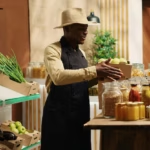In a powerful and candid parliamentary address, Botswana’s Vice President and Finance Minister, Ndaba Gaolathe, deconstructed the government’s vegetable import ban, branding it as “very bad economics.” Here are ten reasons why Gaolathe argues that the policy is unsustainable:
1. Escalating Food Prices
The ban has caused vegetable prices to skyrocket, making basic food items unaffordable for many, especially low-income families. Gaolathe pointed out that people are spending an even higher percentage of their income on food, further exacerbating financial strain.
2. Increased Financial Burden on Vulnerable Groups
Gaolathe highlighted how the ban disproportionately affects low-income groups, who are now spending a greater portion of their already limited budgets on vegetables and food, worsening the poverty situation.
3. Harming Ordinary Citizens More Than Helping Farmers
While some local agricultural producers have benefited from the ban, the Vice President emphasized that it is the average citizen who feels the brunt of the economic hardship, as they face higher food prices with no corresponding increase in wages or disposable income.
4. Short-Term Gains, Long-Term Consequences
Gaolathe argued that while the policy might provide temporary relief for domestic farmers, it is not a long-term solution for the country’s agricultural development. Instead, it risks undermining broader economic goals.
5. Lack of Comprehensive Support for Local Farmers
The Finance Minister called for a more targeted approach to support local farmers, including proper subsidies, research, development, and mentorship. He argued that a ban is not the right way to grow the local agricultural sector.
6. Limited Domestic Market Size
Botswana’s small population and domestic market cannot provide enough demand to create substantial employment or economic growth. Gaolathe advocates for developing export-oriented agricultural industries to create jobs and drive economic expansion.
7. Lack of Competitiveness
Without addressing the fundamental inefficiencies and capacity limitations of local agriculture, the ban prevents Botswana from developing a competitive and globally viable agricultural sector. Gaolathe emphasized that the ban fails to equip farmers with the skills and tools needed to thrive internationally.
8. Missed Opportunities for International Trade
By focusing solely on domestic production, Botswana is missing out on the potential to export agricultural products to neighboring countries and beyond. Gaolathe’s vision is for Botswana to build industries that can generate export revenue, creating more jobs and stimulating economic growth.
9. Unintended Negative Impact on Nutritional Security
With fewer affordable vegetables available, households, especially those in poverty, face limited access to nutritious food. Gaolathe stressed the need for a policy that ensures both food security and affordable access to essential nutrients.
10. Political Divisions on Economic Policy
In his address, Gaolathe clarified his party’s stance, distancing it from the idea of protectionist policies like the vegetable import ban. He reiterated that while the Botswana Congress Party’s “Bring Back Our Jobs” campaign focuses on job creation, it does not support restrictive trade measures that harm citizens’ livelihoods.
Through this powerful critique, Gaolathe has called for a paradigm shift in Botswana’s agricultural policy—one that focuses on sustainable, export-driven growth rather than short-sighted protectionism. His remarks reflect a growing need for policies that balance food security, local development, and economic growth in the long term.










